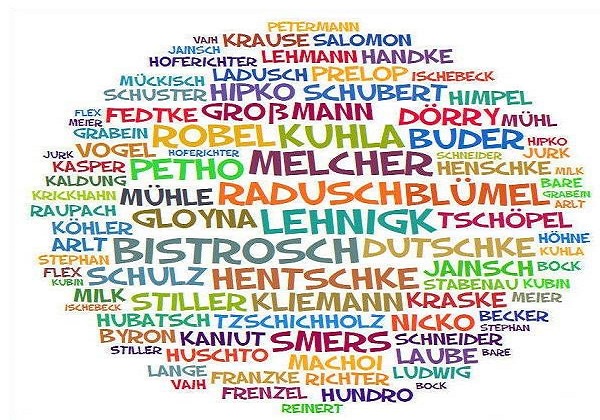
German names carry deep cultural and historical significance, shaping identity and tradition. Many surnames reflect professions, geographic origins, or family lineage, while first names follow distinct naming laws. If you’ve ever wondered why names like Schmidt, Müller, and Bauer are so common in Germany, or why some names are banned, you’re about to dive into a fascinating exploration of German names, their meanings, and traditions.
From medieval occupational names to noble titles and rare first names, this guide unpacks the structure, history, and unique rules governing German names. Whether you’re researching ancestry, choosing a baby name, or just curious about name origins, let’s break down how German naming traditions work.
What is a typical German name?
A typical German name often follows a structured pattern: a first name (Vorname) followed by a last name (Nachname). Traditional German first names include:
- Male: Hans, Karl, Friedrich, Wolfgang, Ludwig
- Female: Anna, Maria, Katharina, Elisabeth, Sofie
Common German surnames come from professions, locations, or family lineage. Some of the most widely recognized include:
- Occupational names: Schmidt (blacksmith), Müller (miller), Schneider (tailor)
- Geographic names: Bayer (from Bavaria), Franke (from Franconia), Hamburger (from Hamburg)
- Patronymic names: Hansen (son of Hans), Jürgen (son of Jörg)
These names originated in medieval times and remain common today, often giving clues about a person’s ancestry.
What is a strong male German name?
Strong German male names often reflect power, history, or nobility. Some classic names include:
- Friedrich – Meaning “peaceful ruler,” associated with powerful German kings and philosophers.
- Ludwig – Linked to King Ludwig II of Bavaria and composer Ludwig van Beethoven.
- Wilhelm – Meaning “resolute protector,” famously borne by Kaiser Wilhelm II.
- Hermann – Inspired by Hermann the Cheruscan, a legendary warrior who defeated the Romans.
- Konrad – Meaning “bold advisor,” associated with medieval rulers and politicians.
These names, though traditional, are still used today, often passed down through generations.
What are rare German names?
Some German names have faded over time but are still unique:
- Male: Baldur, Roderich, Volker, Siegfried, Wenzel
- Female: Hannelore, Irmgard, Waltraud, Lieselotte, Mechthild
Rare names often come from Old High German, mythology, or noble lineages. While some are making a comeback, others are considered old-fashioned.
Are there any banned names in Germany?
Yes, Germany has strict naming laws to prevent inappropriate or misleading names. The rules include:
- No gender-neutral names (with some exceptions like “Sascha” or “Kim”)
- No last names as first names (e.g., Schmidt as a first name is not allowed)
- No brand or object names (e.g., “Mickey Mouse” or “Porsche” would be rejected)
- No names that could cause embarrassment or harm (e.g., “Adolf Hitler” is banned)
Germany’s Standesamt (Civil Registry Office) reviews all names. If a name is considered unconventional, parents must provide proof of historical or cultural usage.
How did German surnames originate?
German last names became standardized in the Middle Ages (12th-14th centuries) as populations grew. There were four primary sources of surnames:
- Occupational Names – Based on professions (Schneider = tailor, Fischer = fisherman).
- Geographical Names – Based on location (Berliner = from Berlin, Rheinländer = from the Rhine region).
- Descriptive Names – Based on physical traits (Schwarz = black-haired, Klein = small).
- Patronymic Names – Based on family lineage (Janssen = son of Jan, Hermannsen = son of Hermann).
Noble families often had “von” (of) or “zu” (at/from) in their names, indicating land ownership. Today, while nobility no longer holds legal status, these names still carry prestige.
What are the key traditions associated with German names?
Germany has unique naming customs that have evolved over time:
- Naming after grandparents: Traditional families often name children after a grandparent or godparent.
- The importance of middle names: While uncommon in daily use, middle names are often given to honor family heritage.
- Double-barreled surnames: Some Germans use hyphenated last names (Müller-Schmidt, Bauer-Weber), though laws now limit these to one generation.
These traditions help preserve family history and maintain strong generational ties.
How is naming regulated in Germany today?
Modern German naming laws ensure clarity, tradition, and gender distinction. Key regulations include:
- First names must indicate gender (exceptions exist, but are rare).
- Names must be officially recognized (unusual names require documentation of cultural significance).
- Hyphenated surnames are limited (children cannot inherit an already hyphenated name).
Parents who choose rare or unconventional names must justify their choice to the Standesamt (Civil Registry Office). If rejected, they must select a new name.
Practical Applications & Real-Life Examples
Where can you explore German name traditions in Germany?
If you want to research German names, some of the best places to visit include:
- The German National Library (Leipzig & Frankfurt) – A treasure trove of historical records and genealogy research.
- Bavaria’s Ancestry Museums – Many small towns in Bavaria have family archives tracing names back centuries.
- The Haus der Geschichte (House of History, Bonn) – Offers insights into how names changed due to migration, war, and political shifts.
Genealogy is a popular hobby in Germany, and many families trace their surnames through church records, old census data, and local archives.
German names are more than just identifiers—they carry history, tradition, and cultural significance. From surnames rooted in medieval occupations to modern naming laws, the structure of German names reflects the evolution of society.
Whether you have a German last name, are researching ancestry, or just love linguistics, understanding how German names work offers a unique glimpse into the past and present.
Want to Learn More About German Traditions?
Explore related articles to deepen your knowledge:







